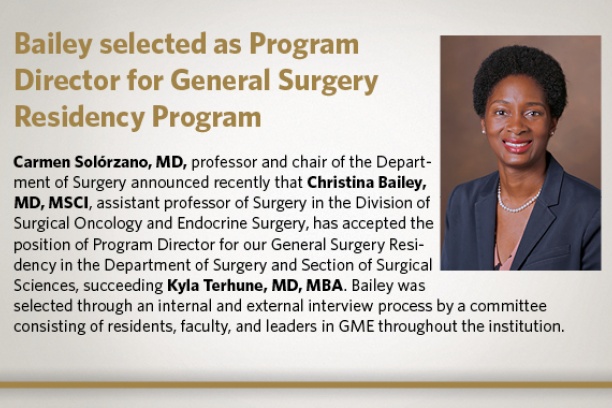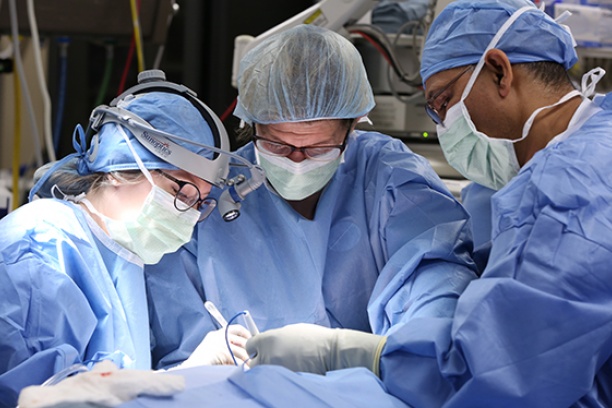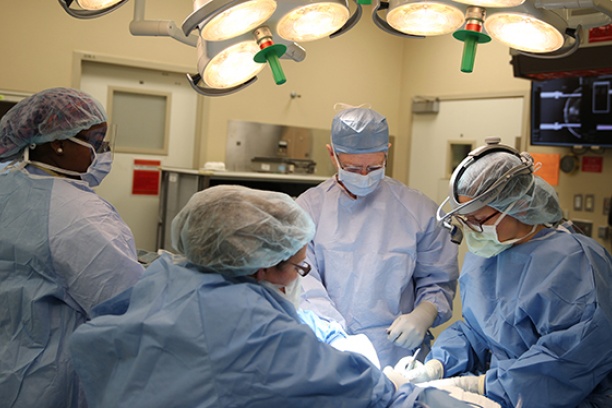Medical Students
The Division of Surgical Oncology and Endocrine Surgery remains committed to providing medical students with a comprehensive experience in all aspects of the treatment of breast and endocrine diseases, soft tissue tumors, and gastrointestinal malignancies.
- 2nd Year Surgical Clerkship
- During the second-year surgical clerkship, a subset of students rotates on the service where they are exposed to all components of the inpatient service including daily rounds, outpatient clinic, participation in operative cases, multidisciplinary management conferences and departmental and divisional teaching conferences.
- 3rd and 4th Year Medical Students
- Students may choose to pursue a one-month clinical elective during their third or fourth year. This rotation provides in-depth exposure to both inpatient and outpatient surgical oncology and endocrine surgery. Participants are encouraged to follow patients through the entire treatment course and to assume greater responsibility for patient care. This includes more direct involvement in operative and postoperative care as well as taking call with junior residents to learn the patient evaluation and management skills necessary for surgical house officers. The senior elective is designed especially for students considering a career in general surgery. It has also been completed by students planning careers in other specialties who are seeking to broaden their knowledge and experience in surgical oncology and endocrine surgery.
General Surgery Residents
The Division of Surgical Oncology is an integral part of the residency in General Surgery and provides intensive training in the management of patients with a variety of solid tumors. Residents at all levels have an exposure to surgical oncology cases. Besides a large operative experience with common as well as unusual tumors, residents receive outpatient experience in the surgical evaluation, preoperative planning and follow-up of a wide range of cancer patients.
The surgical oncology experience includes the outpatient evaluation of benign and malignant breast disorders in the Vanderbilt Breast Center, as well as disorders and tumors of the thyroid gland, parathyroid glands, adrenal glands, and pancreas through the Vanderbilt Endocrine Surgery Center. Emphasis is placed on the multidisciplinary approach in the care of the cancer patient, and there is close interaction with the Divisions of Radiation Oncology, Medical Oncology, Gynecologic Oncology, Hematology, and Surgical Pathology.
Currently general surgery residents rotate on the service at the PGY 1, 3, and 5 levels:
- General Surgery (Oncology/Endocrine) (R1) - VUMC
- General Surgery (Breast/Plastics) (R3) - VUMC
- General Surgery (Endocrine) (R3) - VUMC
- General Surgery (Oncology/Endocrine) (R5) - VUMC
Breast Surgery Fellowship
The Breast Surgery Fellowship is a one-year program and is part of the Vanderbilt School of Medicine, Division of Surgical Oncology and Endocrine Surgery.
Surgical Oncology T32 Fellowship
This grant provides continuing support for post-doctoral training in surgical oncology research for four fellows. The Vanderbilt Department of Surgery has had a continuing commitment to mentored research for both resident research fellows and junior surgical oncology research faculty. Given the rapid pace and complexity of both basic and clinical research, it is imperative to provide trainees with the requisite armamentarium of investigative skills during post-doctoral training. The establishment of both research proficiency and a pattern of mentored training are critical for the promotion of successful academic career pathways. Importantly, configured a multidisciplinary training program to allow development of investigators along basic, patient- oriented or clinical research tracks. All three of these research paradigms are considered crucial to the success of broad-based cancer related investigation. The objective of this program is to prepare surgical residents and post-doctoral fellows for investigative careers in research fields related to surgical oncology. Fellows commit at least two years to intensive training in basic, translational or clinical research through a mentored training environment necessary for the development of experience and proficiency in investigative techniques and reasoning, For those interested in basic science research training, opportunities for mentored investigation are available in the laboratories of scientists with broad interests in cancer biology. In addition to bench research training, fellows in the basic research track will participate in didactic course work as determined by the individual advisory committees. Fellows interested in patient-oriented research training will pursue a Masters of Science in Clinical Investigation (MSCI). The MSCI program combines broad didactic coursework with a mentored research experience focused on patient related material or therapeutic intervention. Finally, those interested in epidemiological or outcomes research will pursue a Masters of Public Health (MPH). The MPH program combines didactic coursework in clinical epidemiology with a mentored clinical research project. These three training tracks allow fellows to pursue pathways best suited to their career objectives.
Funding Source and Application: NIH/NCI
Forward Application to PI: James Goldenring
The current trainees:
Babak Banan (Fingleton) – 2nd year of 2
David Hanna (Beauchamp) – 1 of 1
Hannah Marmor (Grogan) – 1 of 2
Woody Smelser (Penson/Chang/Kirschner)1 of 2
Incoming FY22:
Taylor Sutcliff (Solorzano) 1 of 2
Caroline Godfrey (Grogan) 1 of 2
Hannah Marmor (Grogan) 2 of 2
Woody Smelser (Penson/Chang/Kirschner) 2 of 2
Other Education Programs
Faculty members from the division play an important role in a variety of other educational programs locally, regionally, nationally and internationally. Within the Medical Center, this includes lectures for several undergraduate medical classes including the introduction to physical diagnosis course and presentations on the surgical treatment of malignancies for the medical oncology and radiation oncology fellows.
They serve as preceptors for advance practice nursing students and participate in a novel program for cancer biology graduate students. Community outreach is a major focus for the division including CME presentations at regional hospitals and participation in a variety of educational symposia locally and nationally.


